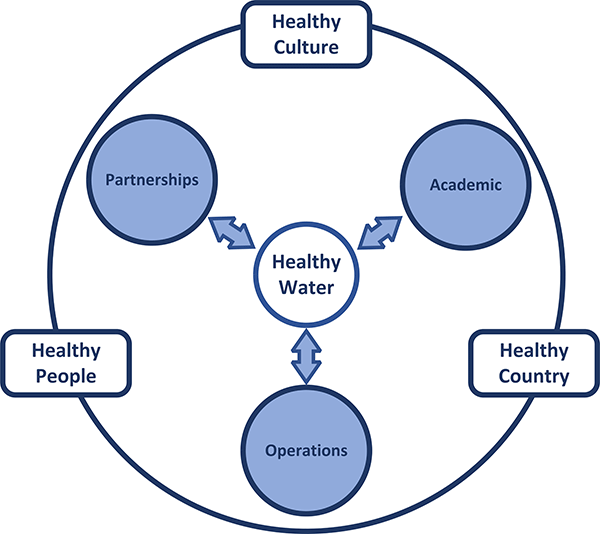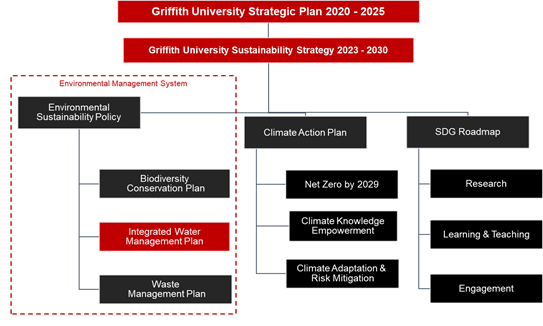Griffith University is delivering integrated water management to achieve the best outcomes for all
Integrated water management considers all elements of the water cycle and unites government, local stakeholders and communities to achieve the best water outcomes within the catchment and beyond.
Our integrated approach aligns with water management principles from the United Nations Sustainable Development Goals through to Commonwealth, state and local government policy, planning and legislation. We implement integrated water management throughout our operations, academic activities and partnerships to support healthy catchments and to protect and enhance the social, cultural, environmental and economic value of South East Queensland’s iconic waterways and marine environments.
We seek to ensure our campuses meet water-sensitive urban design best practice to prevent pollution from being released into the environment, reduce consumption of potable water, maximise water reuse, manage important aquatic environments and adapt to the impacts of climate change. Our approach is supported by our world-leading research, which informs our own and other communities’ policies and actions to prevent waterway pollution and manage coastal and marine environments. Our water management work aims to strengthen our partnerships with governments and conservation groups to benefit communities by improving catchment health and promoting conscious water usage through collaboration on policy, education and actions.
First Peoples' water management
We acknowledge Aboriginal and Torres Strait Islanders' unique relationship with, understanding, and ongoing stewardship of these lands.
Griffith University campuses sit on the lands of the Yugarabul, Yuggera, Jagera, Turrbal, Yugambeh and Kombumerri peoples. We acknowledge Aboriginal and Torres Strait Islanders’ unique relationship with and understanding and ongoing stewardship of these lands. Through collaboration with staff, students and community members we are committed to embedding Indigenous cultures and diverse knowledge systems in our learning and teaching, research, operations, and partnerships. Griffith acknowledges Elders past and present who guide the way to a more sustainable future for all. Under the guidance of the Griffith University Elders and First Peoples Knowledge Holders Advisory Board we seek to ensure sustainability actions are aligned with First Peoples’ knowledges and cultural practices.
Griffith University’s actions to improve freshwater and marine aquatic environments are underpinned by our strong commitment to First Peoples’ knowledges and cultures and recognises that Aboriginal and Torres Strait Islander people have maintained unique relationships to and cared for the land, sea, waterways and the air above and around us for thousands of years.
Griffith University continues to value and incorporate First People's knowledge and practices into our environmental management approaches as we walk a path towards reconciliation, in line with First People's understanding that "If the water is healthy, Country is healthy. If Country is healthy then the People and Culture will be healthy." Brad Moggridge, Kamilaroi man (Adapted from Moggridge B 2010, Aboriginal Water Knowledge & Connections, in: Water and its Interdependencies in the Australian Economy, 22 to 23 June 2010, Australian Academy of Technological Sciences and Engineering, Sydney).

Integrated water management at Griffith University
Griffith University is committed to the principles of clean water, sanitation, water security and healthy aquatic ecosystems, and adopts an integrated water management approach for the whole of the water cycle across our campus operations. Our research, teaching and partnerships in water management ensure we make a positive impact beyond our campuses and address challenges within the catchment, watershed and sanitation contexts of our communities.
Through our operations, we follow water-sensitive urban design principles and environmental best practices to prevent pollution being released into the environment, reduce consumption of potable water, maximise water reuse, manage important aquatic environments, and adapt to the impacts of climate change. This approach is supported by our world-leading research, which informs our own and other communities’ policies and actions to prevent waterway pollution and manage coastal and marine environments. Our water management work aims to strengthen our partnerships with governments and conservation groups to benefit communities by improving catchment health and promoting conscious water usage through collaboration on policy, education and actions.
In accordance with the Griffith University Sustainability Framework, the University is developing a plan to ensure our approach to integrated water management continues to align with contemporary best practice and achieves tangible outcomes for the important catchments within which the University operates.

Policy context
Griffith University’s approach to watershed management at all of its campuses is informed by international, state, and local policies, and leverages Griffith’s academic leadership to influence water management through education, research, and partnerships. The University’s water plan incorporates principles from multiple United Nations Sustainable Development Goals (SDGs), particularly focusing on access to clean water, pollution prevention, ecosystem protection, and efficient water use. It also emphasises the importance of integrated water resource management and strengthening local partnerships. By aligning with these global and local goals, Griffith University aims to ensure sustainable water management both on its campuses and within the broader community.
The University’s water management efforts are guided by state legislation and local government strategies, which emphasise water-sensitive urban design, sustainable consumption, and the protection of environmental values. State-based policies shaping Griffith University’s water management include the "Shaping SEQ" strategy, which sets benchmarks for water-sensitive communities, emphasising the protection and sustainable management of regional catchments. We also align with legislative requirements for safeguarding environmental values of wetlands and waterways under the Environmental Protection Act 1994 and related policies. Additionally, we adhere to basin-level requirements from the Water Act 2000 to maintain minimum environmental and cultural water flows.
With five campuses across three local government areas, we also align our operations with local government strategic planning intent (including Brisbane's Total Water Cycle Management Plan and the Gold Coast Water Strategy 2019-2024). This includes:
- water management that considers the whole of water cycle
- incorporation of water sensitive urban design into development
- sustainable water consumption, considering reuse and rainwater harvesting opportunities where practical
- valuing the important role healthy waterways play for the local community, environment, and economy
- consideration of climate change impacts on the water cycle.
Integrated water management and the SDGs
The United Nations Sustainable Development Goal 6 (Clean Water and Sanitation) and Goal 14 (Life Below Water) set the global strategic priorities for sustainable water management (United Nations 2015) at Griffith. Our water management approach incorporates the SDG principles in order to:
- provide access to clean and affordable drinking water
- prevent waterway and marine pollution and promote water recycling and reuse
- protect and enhance South East Queensland catchments and marine ecosystems
- reduce water consumption and increase water-use efficiency across campuses
- provide integrated water resources management
- support sustainable management and research for catchments
- support and strengthen local partnerships for water management.
Contact Griffith Sustainability
Griffith Sustainability Room 2.40, Building N54, Griffith University, 170 Kessels Road, Nathan QLD, 4111